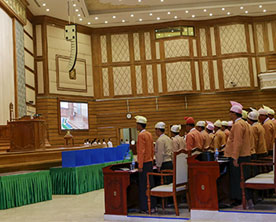Officials at the Union Election Commission (UEC) of Myanmar are now on their way to submit a Representative Recall Bill to parliament. The move is apparently an acknowledged response to the raising public voice that calls for a mechanism that allows the recall of a lawmaker. The call has been on the rise after the public saw controversies associated with the misconducts of some of the member parliamentarians of the ruling National League for Democracy (NLD) party that include an extramarital affair and a drunken brawl with staff of a motel. Public outcry over the capacity and performance of the legislators who were elected to the 2nd Pyidaungsu Hluttaw, the national-level bicameral legislature of Myanmar, has added mounting pressure to the issue.
The UEC has finally developed a Right of Recall bill drafted in line with the constitutional provisions, commission member Aung Myint said on February 6. The bill is designed to comply with the legal framework of the constitution with inputs being obtained from reviewing the parliamentary discussions on the matter made in the 1st Pyidaungsu Hluttaw (Assembly of the Union), according to Aung Myint. The information came out when the commission member replied to a question raised by a representative representing the opposition USDP (Union Solidarity and Development Party) on the third day of the second regular session of the 2nd Pyidaungsu Hluttaw.
While a total of 48 laws were suggested by parliament’s Commission for the Assessment of Legal Affairs and Special Issues to be given priority in legislation, a Recall law was absent in the advice. Thus the lawmaker, who presented the question, stood up to ask whether there was any plan to enact a Representative Recall law to fulfil the voters’ desire.
Election commission member Aung Myint said the draftsmen put much effort in the drafting process to make the bill flawless so far as possible, ensuring it against too much argument by parliamentarians. A potential Representative Recall law has long been debated with no deal on voter requirement being settled among the representatives of different political parties. During the tenure of the previous government, the UEC in June 2012 submitted a Right of Recall bill to parliament and it was discussed twice in 2013 and 2015, just to go down the drain as the legislators did not reach a compromise on the requirement for number of voters to sign a recall petition.
A subsection of section 396 of the Myanmar constitution prescribes that voters can pursue a recalling process against a representative by submitting a complaint endorsed by a minimum of one per cent of the original voters of the electorate in the lawmaker’s constituency to the Union Election Commission.
By the time the issue was first brought to parliament, MP Dr Nyo Nyo Thin from Yangon Region legislature argued that the percentage should be changed, since one per cent of voters was very few that the process might be just prompted by personal hatred. MP Brigadier General Tint San, one of the military-appointed parliamentarians, said that people were entitled to recall the lawmakers whom they thought weak or not doing their duty, adding that it was a fair way to execute checks and balances. A Recall law would restrain those representatives who ignore the interest of the communities in their constituencies, said Hla Swe who was then a parliamentarian from the USDP. Win Myint, who was then an opposition lawmaker representing the NLD and now the Speaker of the Pyithu Hluttaw (House of Representatives – Lower House), expressed his concern at the low percentage of the electorate to complain and remove a member of parliament from his position. Although he agreed that there should be a ‘Right of Recall’ bill, the veteran politician considered that the essence of democracy would be annihilated if MPs had to relinquish their seats because of only one per cent of their electors. The requirement of only one percent could pose a hindrance to relations between parties and national reconciliation, Win Myint added.
Aung Kyi Nyunt, who is now the chair of the bill committee for the Amyotha Hluttaw (House of Nationalities – Upper House), also warned the possible effect on national reconciliation if the bill was enacted hastily. He called for a deeper discussion of the differences between the two chambers by reviewing the remarks made by the committee.
The NLD’s suggestion to increase the rate to 20 per cent was rejected in the parliamentary discussions of the 1st Pyidaungsu Hluttaw. The former Recall bill was suspended by the previous Pyidaungsu Hluttaw with 264 legislators voting to postpone, 235 to pass, and 12 in abstention. The bill was expected to be taken back to discussion only when the following Pyidaungsu Hluttaw was commenced.
During the first push, the representative who proposed to parliament to enact a Right of Recall law was from the USDP. The two parliamentary chambers disagreed on the matter. Now it is the second time a Representative Recall bill is to be put on legislative debate. It is quite interesting to wait and see if the bill will turn into a law, and if so, how the requirement for number of voters to act on it will be settled.










